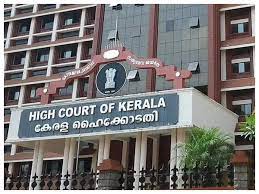 The Kerala High Court in the case of MATHAI M.V. vs. THE SENIOR ENFORCEMENT OFFICER & ORS. Vide WA No. 973 of 2025 dated 24.06.2025, held that confiscation of a vehicle under Section 130 of the CGST Act without serving notice to the owner and without following due process is illegal. Communication via WhatsApp is not a valid mode of service under Section 169. The confiscation order was thus vitiated for procedural non-compliance and the matter was remanded for de novo adjudication.
The Kerala High Court in the case of MATHAI M.V. vs. THE SENIOR ENFORCEMENT OFFICER & ORS. Vide WA No. 973 of 2025 dated 24.06.2025, held that confiscation of a vehicle under Section 130 of the CGST Act without serving notice to the owner and without following due process is illegal. Communication via WhatsApp is not a valid mode of service under Section 169. The confiscation order was thus vitiated for procedural non-compliance and the matter was remanded for de novo adjudication.
Facts of the Case: In this case, the petitioner is the owner of a truck engaged on 23 November 2024 to transport bilge water. The vehicle of the petitioner was confiscated on 25 November 2024. Later, on 10 January 2025, the petitioner received a copy of the detention order, which mentioned that a notice under Section 130 of the CGST Act, 2017 was served upon the consignor i.e. M/s Petro Chemicals for alleged tax evasion.
The petitioner filed the petition before the court to challenge the detention and confiscation of his vehicle, alleging that no notice was served upon him prior to the confiscation, he received neither the notice nor the confiscation order prior to the actual seizure. Also, truck continued to remain in government custody, causing financial loss.
However, the respondents claimed that notice was served on the driver and communications were made to the petitioner via WhatsApp. The petitioner was fully aware of the proceedings and received the confiscation order. The proceedings under Section 130 were concluded by order dated 21 December 2024.
Issue: Whether proper notice under Section 130 of the CGST Act was served on the petitioner before the confiscation of his vehicle
Held that: The Court stated that u/s 130(4) of the CGST Act, confiscation cannot be ordered without giving the owner an opportunity of being heard. This opportunity is crucial, especially when the owner can prove lack of knowledge or connivance in the alleged tax evasion under Section 130(1)(v).
Further, WhatsApp communication does not constitute valid service of notice under Section 169 of the CGST Act. Proper modes like registered post, email on record, or portal upload are required. Hence, No valid notice under Section 130 was served on the petitioner.
The confiscation of the vehicle without issuing a notice to the owner was procedurally illegal and violated principles of natural justice. Reliance placed upon Gujarat High Court decision in M/s Lakshay Logistics and Madras High Court decision in Poomika Infra Developers where similar confiscations were quashed for lack of notice.
The Court quashed and set aside the confiscation order, the matter was remanded to the competent authority with direction to issue proper notice under Section 130 and provide an opportunity of hearing.
To read the complete judgment 2025 Taxo.online 1293


